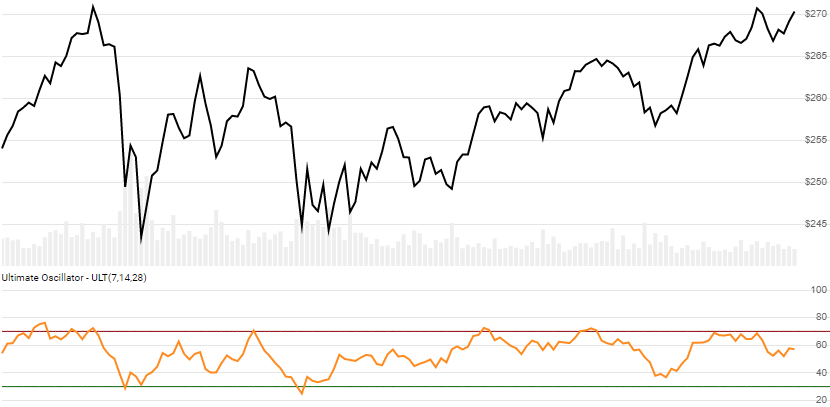Ultimate Oscillator
Created by Larry Williams, the Ultimate Oscillator uses several moving averages to weigh buying power against true range price to produce on oversold / overbought oscillator. [Discuss] 💬

// C# usage syntax
IEnumerable<UltimateResult> results =
quotes.GetUltimate(shortPeriods, middlePeriods, longPeriods);
Parameters
shortPeriods int - Number of periods (S) in the short lookback. Must be greater than 0. Default is 7.
middlePeriods int - Number of periods (M) in the middle lookback. Must be greater than S. Default is 14.
longPeriods int - Number of periods (L) in the long lookback. Must be greater than M. Default is 28.
Historical quotes requirements
You must have at least L+1 periods of quotes to cover the warmup periods.
quotes is a collection of generic TQuote historical price quotes. It should have a consistent frequency (day, hour, minute, etc). See the Guide for more information.
Response
IEnumerable<UltimateResult>
- This method returns a time series of all available indicator values for the
quotesprovided. - It always returns the same number of elements as there are in the historical quotes.
- It does not return a single incremental indicator value.
- The first
L-1periods will havenullUltimate values since there’s not enough data to calculate.
UltimateResult
Date DateTime - Date from evaluated TQuote
Ultimate double - Ultimate Oscillator
Utilities
See Utilities and helpers for more information.
Chaining
Results can be further processed on Ultimate with additional chain-enabled indicators.
// example
var results = quotes
.GetUltimate(..)
.GetSlope(..);
This indicator must be generated from quotes and cannot be generated from results of another chain-enabled indicator or method.